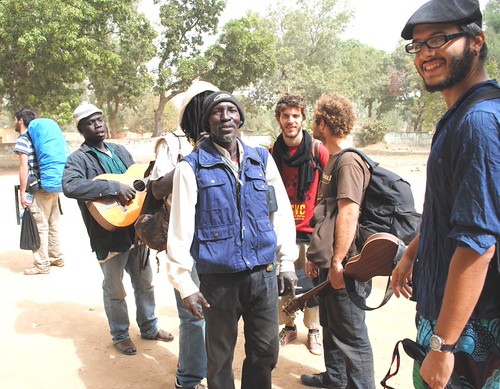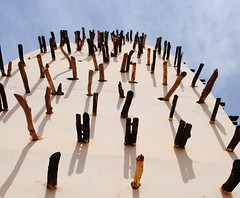It has been the most incredible journey of both of our lives. There have been challenges; the heat, the hills, the dust and the desert.
We set this blog to publish as our flight takes off out of Africa. I guess it’s a bit of a symbolic posting. It’s a goodbye blog.
We want to share a few photos we had been saving for the right moment. Some of these faces you may have seen in previous postings, some are new, but all showed us pure kindness, warmth and generosity. For that reason we wanted to devote a blog to the theme of generosity. These are the faces we will not forget as we leave African soil.
Mama: It had been a long day of cycling. We had never slept in a village before. She welcomed us with warmth, fed us and even gave us a crash course in Wolof. It was to be the first of many village camping experiences.
Cheick shared a roadside pot of tea with us one hot Malian lunchtime. He had lost a bull and hadn’t had the best of days. But he dismissed his misfortune and instead welcomed us to the village, occasionally leaving us to make bull-related phone calls.
Pete: We met on the ferry to France. He was our adopted dad for the first leg of our trip. He encouraged us, kept our spirits up when our bums were burning and shared some very useful bike-touring wisdom with us. He was our first friend of the trip.
Tentatively we peeked through the bushes at a group of party-goers, only to be snapped up by the father of the bride who insisted that we join the festivities. We shared goats milk and attempted to learn a few words of Fula. It was the perfect half hour.
With a contagious smile he opened his home to us. Boubacar Kone is an artist, a philosopher, a businessman, but most of all he’s everyone’s friend. Bouba had polio as a child and now runs ‘Handicape Production’, a small shop selling his artisan work.
Ba Fousseyni: What can we say? Fousseyni, our Malian uncle and good friend. He fed us, offered us a home and became a very wonderful friend to have around.
Sodio Boureïma: It was getting close to 50 degrees in the midday sun and we had been cycling on ‘corrugated iron’ sand piste for a long time… visibly exhausted we were heckled from the road and invited to rest. We napped at his side and when we awoke, waiting next to us was a pot of tea and a bowl of mangos.
Jaliba Kuyateh: We had heard about him, turned up at his house on a whim and ended up sharing almost a week with him and his family. Generous and wise, he showed us a truly different side to The Gambia.
Mama Lamlih: Baking us fresh bread every morning, preparing us a special couscous dinner (it wasn’t even ‘couscous friday’), she was the heart of the fantastic Lamlih family and made sure we felt at home as we entered the desert.
Souleymane and Chekoroba: We met in Bamako, their home city. They agreed to teach Mikaela a couple of Bamana songs. A couple of songs turned into a true friendship, based on wonderful descriptive song translations from Chekoroba, the beautiful songwriting of Souleymane (which we ended up recording) and of course, Chekoroba’s mother’s ‘giniberri’ (ginger juice)..! We felt part of a family.
Souleymane
Chekoroba- Photograph by Florant Lalet

There is a Moorish proverb that puts it more simply,
To travel is to know the true value of mankind.






























































































